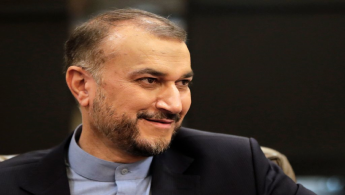Iran ready to build two power plants in Lebanon: Iranian foreign minister
Iran is ready to build two power plants in Lebanon, one in Beirut and the other in the south of the country, in a period of 18 months, Iranian Foreign Minister Hossein Amir-Abdollahian said after meeting Lebanese officials on Thursday.
He also told a news conference in Beirut that Iran is willing to help rebuild the capital's port, destroyed by a massive blast in August 2020, if the Lebanese government makes such a request.
The explosion devastated swathes of the Lebanese capital and left more than 200 people dead.
Amir-Abdollahian is on his first visit to Lebanon since taking his post after Iran’s presidential elections this summer. He arrived in Beirut late Wednesday from Moscow.
The Iranian minister also discussed with Lebanese officials the "positive" effects of ongoing talks between Iran and Saudi Arabia, and blamed foreign troops based in the Middle East for regional instability.
He also said nuclear talks to revive Tehran’s now-tattered 2015 accord with world powers, stalled since June, will resume soon.
"We have positively evaluated the continuation of Iranian-Saudi negotiations," Amir-Abdollahian told reporters after meeting Parliament Speaker Nabih Berri, referring to multiple rounds of discussions in Baghdad since the first direct talks between regional foes Riyadh and Tehran took place in early April.
The latest round was held late last month, according to Iraqi officials, marking the first such meeting between the two sides since a new president was sworn in in Tehran. Those at the meeting discussed "pending issues between the two countries according to a previously agreed on a roadmap, including diplomatic representation between the two countries," according to one Iraqi official.
An improvement of relations between Iran and Saudi Arabia is likely to have positive effects in Lebanon, a small nation that has often served as a proxy battlefield for tensions between the two regional powers.
Iran enjoys wide influence in Lebanon through the powerful Hezbollah group that is funded and armed by Tehran. Lebanon is deeply divided between a coalition backed by the West and Gulf Arab countries, and another group supported by Iran and led by Hezbollah.
In an apparent reference to U.S. forces deployed in the region, Amir-Abdollahian said: "We consider the presence of foreign forces in the region as the main factor for instability and all problems."
Earlier in the day, the Iranian official held talks with President Michel Aoun, where he expressed the Islamic Republic’s support for the small nation suffering through a severe economic crisis.
Some Lebanese opposed to Iran’s influence in Lebanon held a small protest against the foreign minister's visit in Beirut on Wednesday, carrying banners that read "Iran out."
Last month, dozens of trucks carrying Iranian diesel began arriving in Lebanon, part of a series of deliveries organised by Hezbollah to help ease crippling shortages in the cash-strapped country. The powerful group operates independently from Lebanese authorities, which are struggling to deal with a crippling energy crisis. Lebanese authorities said they were not involved in the shipment, which violates U.S. sanctions placed on Tehran.
The third Iranian tanker carrying diesel arrived in the Syrian port of Baniyas this week and the fuel will be shipped to Lebanon by tanker trucks.
(This story included content from Reuters)





 Follow the Middle East's top stories in English at The New Arab on Google News
Follow the Middle East's top stories in English at The New Arab on Google News
![The UAE is widely suspected of arming the RSF militia [Getty]](/sites/default/files/styles/image_330x185/public/2024-11/GettyImages-472529908.jpg?h=69f2b9d0&itok=Yauw3YTG)
![Netanyahu furiously denounced the ICC [Getty]](/sites/default/files/styles/image_330x185/public/2024-11/GettyImages-2169352575.jpg?h=199d8c1f&itok=-vRiruf5)
![Both Hamas and the Palestinian Authority welcomed the ICC arrest warrants [Getty]](/sites/default/files/styles/image_330x185/public/2024-11/GettyImages-2178351173.jpg?h=199d8c1f&itok=TV858iVg)